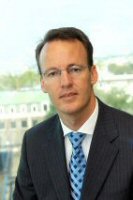Prof. dr. Klaas Knot nieuwe topman op Ministerie van Financiën

Hoogleraar Klaas Knot is per 15 augustus 2009 benoemd tot directeur Financiële Markten op het ministerie van Financiën. Ook wordt hij plaatsvervangend Thesaurier-Generaal. Naast zijn parttime hoogleraarschap bij FEB is Knot momenteel ook divisiedirecteur bij De Nederlandsche Bank.
De in Bedum geboren Knot (42) is de opvolger van Bernard ter Haar die topman wordt bij het ministerie VROM. Klaas Knot studeerde economie aan de Rijksuniversiteit Groningen. In 1991 rondde hij zijn studie af en vier jaar later promoveerde Knot tot doctor. In 2007 werd hij benoemd tot hoogleraar. Momenteel is professor Knot een dag in de week verbonden aan de Faculteit Economie en Bedrijfskunde waar hij de leerstoel Geld- en Bankwezen bezet.
In zijn functie als divisiedirecteur Toezicht Beleid bij De Nederlandsche Bank is prof. dr. Klaas Knot onder meer verantwoordelijk voor het ontwikkelen van prudentiële toezicht standaarden en regelgeving en beleid voor banken, verzekeraars en pensioenfondsen. Eerder werkte hij ook in verschillende functies bij De Nederlandsche Bank en het Internationaal Monetair Fonds (IMF) in Washington.
Meer nieuws
-
09 december 2025
Zijn robots de oplossing?
-
10 november 2025
Decentralisatie van de jeugdzorg
